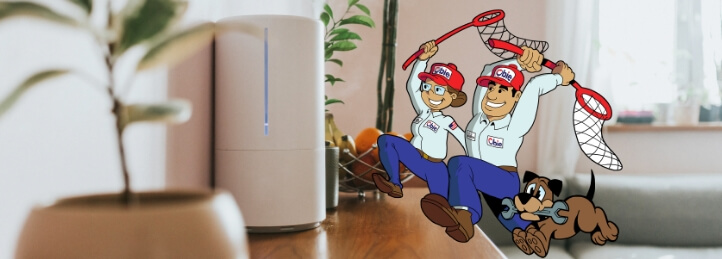Indoor Air Quality Services in Framingham, MA

When most people think of indoor home comfort, they think about keeping their home at a comfortable temperature. However, your home’s indoor air quality (IAQ) is equally important. From high humidity to inadequate ventilation, you and your family don’t have to suffer from the effects of poor IAQ. Work with Obie Comfort Solutions for indoor air quality systems that will revitalize your home’s indoor air.
- Services Tailored to Your Individual Needs
- NATE and EPA-Certified Technicians
- Your Satisfaction Is Our Mission
From the initial consultation to determine what type of IAQ system is best for your home, to the installation itself, our Obie Service Technicians make indoor air quality services as seamless and stress-free as possible.
Trust Obie Comfort Solutions for IAQ services in Framingham, MA. We're Not Comfortable Until You're Comfortable!
Why Is Indoor Air More Polluted Than Outdoor Air?
Here’s a fact that may surprise you. The Environmental Protection Agency estimates that in US homes, the concentrations of some pollutants are often 2 to 5 times higher than typical outdoor concentrations. Combine that with the fact that the average American spends approximately 90% of their time inside. That adds up to a lot of people spending a lot of time indoors in tightly sealed, poorly ventilated homes, breathing in pollutants.
Your well-insulated, energy-efficient home was designed to keep your utility costs as low as possible, but a negative side effect of a well-constructed home is that it increases the amount of indoor concentrations of pollutants. Further contributing to the problem is the increased use of synthetic building materials, furnishings, personal care products, pesticides, and household cleaners.
Sore throats, stuffy noses, sneezing, fatigue, headaches, and even the inability to concentrate are symptoms of poor indoor air quality. Continual exposure to indoor pollutants can lead to serious health conditions such as heart disease, chronic respiratory illnesses, and even cancer. Let’s go over some of the most common sources of indoor air pollution.
Household Products
Ironically enough, many of the household cleaning products and air fresheners that are used to keep a home clean, fresh, and smelling good are the most common sources of poor indoor air quality. Cleaning products, personal care items, air fresheners, and even candles contain harmful chemicals known as volatile organic compounds (VOCs). VOCs are gasses emitted from certain solids or liquids. VOCs come from everyday products and indoor furnishings and include:
- Gasoline, fuels, solvents, and pesticides
- Paints, varnishes, furniture polish, strippers, and finishes
- Personal care products such as deodorants, cosmetics, shampoos, nail products, sunscreen, and lotions
- Cleaning products such as bleach, carpet cleaners, oven cleaners, dishwashing liquids, and laundry detergents
- Room deodorizers, aerosol sprays, air fresheners, and candles
- New cabinets, furniture, carpets, rugs, and wood floors
- Craft products such as glues, adhesives, paints, and markers
Building Materials
Chemicals from building materials are another prevalent source that contributes to poor indoor air quality. Synthetic materials used in composite wood products, plywood, carpeting, vinyl, furniture, and adhesives can emit harmful chemicals such as formaldehyde.
Cooking and Combustion
Many homeowners are surprised to learn that the simple act of preparing food can cause indoor air pollution. Cooking and preparing food uses combustion appliances such as gas stoves that allow nitrogen dioxide and carbon monoxide into the air. Heating ingredients such as oils and fats at high temperatures also release VOCs. The high heat levels required for cooking can result in countertops and cabinets off-gassing chemicals.
Outdoor Pollutants
Outdoor air pollutants seep into homes through open doors and windows, your home’s ventilation system, and even through cracks in structures and foundations. Chimney smoke, ozone, pesticides, nitrogen dioxide from diesel exhaust, particulate matter, and radon can enter your home and cause poor indoor air quality. Also, common allergens found outside such as pollen, dust, grass, trees, weeds, and mold spores can make their way into your home, especially when household members come home and inadvertently bring in soils and dust on their shoes and clothing.
Mold and Mildew
Homes with high humidity levels due to poor ventilation or moisture problems are prone to mold growth. Mold will thrive in cool, dark, and damp environments, which homes in Massachusetts have in abundance. Mold can develop in just about any area of your home that provides suitable conditions including your ventilation system. Mold and mold spores are harmful to everyone, but people with asthma, allergies, and respiratory issues are especially susceptible to mold growth.

Whole House Solutions to Improve Your Indoor Air Quality
Eliminating the sources of air pollution and providing adequate ventilation are both required to improve your home’s indoor air quality. We provide professional installation of whole house systems that integrate with your HVAC system to clean the air and balance humidity levels in your home. Here are some products that will boost your home’s indoor air quality.
Air Purifiers
An air purifier cleans the air using a HEPA filter. Air purifiers seamlessly integrate with your ventilation system to purify the air that circulates throughout your entire home. Whole house air purifiers excel at removing harmful particulates such as mold, dander, viruses, pollen, allergens, and odors.
Air Filtration Systems
Air filtration systems work especially well if anyone in your household suffers from allergies, asthma, or respiratory conditions. These whole house systems are installed directly into your ductwork for comprehensive coverage.
Humidifiers and Dehumidifiers
Does your home suffer from dry winter air and humid summer conditions? In the winter, balance your indoor humidity levels with a whole house humidifier. The ideal humidity level is between 30–50%. Dry air can lead to sore throats, stuffy noses, an increased risk of illness, and cause damage to your wood furniture and flooring.
Muggy summer weather not only wears you down, but it can lead to mold growth in your home. Although your air conditioner removes some moisture from your home, it’s often not sufficient. A whole house dehumidifier is the solution you need to balance your home’s humidity levels.
ERV and HRV Systems
Poor ventilation contributes to low indoor air quality. But how do you bring in fresh air without wasting conditioned air generated by your HVAC system and increasing utility costs? An energy recovery ventilator (ERV) and a heat recovery ventilator (HRV) are great solutions for bringing fresh, clean air into your home without increased utility costs.
UV Germicidal Lights
Do you want to reduce winter colds and illnesses in your household? UV germicidal lights are designed to specifically combat biological contaminants such as mold spores, mildew, pathogens, fungi, and bacteria. They are also effective at removing pollutants that cause bad odors.
A common question from homeowners: Are UV germicidal lights safe?
It’s natural to assume that a system that uses UV light is potentially harmful. After all, it’s UV light that causes sunburns and skin cancer. However, the UV lights are installed in your home’s ductwork or air handler. As air circulates through the system, it passes by the UV light. Homeowners can rest assured that these systems are perfectly safe and that there is no risk of exposure to the UV light. In fact, hospitals and industrial settings have used these systems for years.
Choose the Team With NATE and EPA Certifications
When you’re deciding which IAQ systems to have installed in your home, consult with a team of experts that hold certifications from the EPA and NATE. That’s us! With our advanced certifications, you can rest assured that we are highly trained and ready to pass on our knowledge about IAQ systems. Not only that, but our continued certification training requires our Obie Service Technicians to stay abreast of the latest innovations in IAQ technology.
What Is EPA Certification?
EPA stands for the Environmental Protection Agency and this certification has to do with the environment and adherence to eco-friendly HVAC practices. To become EPA-certified, a technician must demonstrate knowledge about the laws, rules, and regulations surrounding the use and handling of HVAC chemicals such as refrigerants and ozone-depleting chemicals.
What Is NATE Certification?
NATE stands for North American Technician Excellence. NATE is the largest non-profit heating, ventilation, air conditioning, and refrigeration (HVACR) organization in the US. When you hire a contractor who is NATE-certified, you can feel confident that you are working with a highly trained and experienced contractor. Continued NATE certification requires additional training and continuing education. This means that our technicians stay abreast of HVAC technology and possess a demonstrated knowledge of today’s HVAC and IAQ systems.

Why Portable IAQ Products Aren’t Sufficient
Now you’re convinced that your home’s indoor air quality needs some serious help. You may be tempted to purchase a portable air filter or humidifier, assuming that will be sufficient. However, these products have serious shortcomings. Small, portable units need a lot of maintenance and looking after. Not only that, their coverage area is small and you’d need multiple units for them to be effective. Here are the drawbacks of portable IAQ devices.
- They have limited coverage area: Portable devices are designed to work in small spaces such as a bedroom or office. If you’re trying to improve air quality in a larger living space or an entire home, you’ll need multiple units, which can get expensive especially when you consider the ongoing cost of replacement filters for each unit.
- They’re noisy: Even units that promise to be "whisper quiet" make discernible noise, especially when operating at high settings. The noises they generate can be particularly bothersome if you work at home during the day and at night when you’re trying to sleep. Whole house systems are noiseless so you won’t notice them.
- The replacement filters are expensive: Portable units can be inexpensive. The replacement filters? Not so much. Not only is it annoying to have to keep purchasing filters, but remembering when to replace them is a hassle. You won’t have to worry about that with a whole house system.
- They only address certain pollutants: Most portable devices are not effective at removing larger particles, gasses, or volatile organic compounds (VOCs).
Our Comprehensive Indoor Air Quality Services
Although they’re designed to work seamlessly with as little inconvenience to you as possible, IAQ systems are still subject to the occasional repair need or maintenance service. And when your IAQ system is no longer combatting odors, humidity, or allergens, you’ll notice it immediately.
Contact us if you detect any issues with your systems. Whether your system starts making strange noises or is not responding correctly, our team will quickly troubleshoot the problem and fix it. Don’t wait until a minor issue turns into a major repair.
Preventative maintenance plays a vital role in the performance of indoor air quality systems. Let’s work together to create a planned maintenance schedule that fits your needs and budget. Sign up today for our Obie Comfort Club and enjoy peace of mind knowing a trusted professional is watching over your IAQ equipment.








